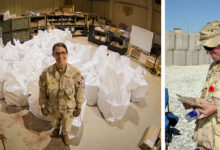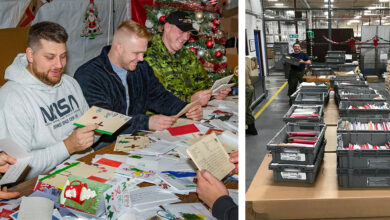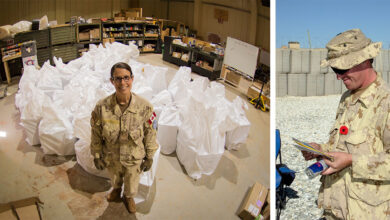Deployment TipsterWhile They're Away
10 Strategies to Survive a Deployment
Whether you are preparing for a deployment, in the first few weeks of one, or at the tail end, we have 10 strategies sure to help you.
Ask, Ask, Ask
Let’s start with asking for help. It may seem you are a team of one and the world rests on your shoulders, with home, kids, job, pets, and the responsibility list goes on. It is important to ask for help. Be realistic with this strategy. Requesting the unit to come over and paint your house may be unrealistic. But finding another mom that you can swap childcare with so you can grocery shop kid-free or booking your child into the MFRC drop-in childcare program may not be. Remember to ask for help.
Schedule a Recharge Day
When you are on your own and managing the home front by yourself, thinking about you and your needs can fall off your daily task list. Scheduling a recharge day will benefit you. This day will vary from person to person. It could be binge watching shows, going for a hike, hanging out at the beach, reading a book on your deck, or baking, just to name a few activities. Make sure you take care of yourself and manage your energy. Try not to burn the candle at both ends by looking after yourself.
Walk. Run. Namaste.
The best stress and anxiety buster is exercise. Studies show that it is effective at also reducing fatigue, improving alertness, concentration, and enhancing cognitive function. It could be as simple as investing 10 minutes of your day for a walk. When you exercise, you are pumping up the production of endorphins: the brain’s feel-good neurotransmitters. So whether you walk, run, swim, work out, or do yoga, find an activity that creates those endorphins. Plus, getting out there and moving your body improves your mood. It’s a win-win.
Know Your Boundaries
You may be of the philosophy of keeping busy while your loved one is deployed, but make sure you know your limits and don’t fill all your time because that will lead to burnout. When you are a one-person show, there is not a number two to replace you while you have a breakdown. Sure, volunteer and help your friends, but make sure you have time for yourself. Remember, you are allowed to say “No.” We are giving you permission.
Meal Plan
Save time, money, and energy by planning ahead. This can be as simple as opening a spreadsheet and listing the days of the week and what you are going to eat, or as complicated as creating a large board that has days of the week and mealtimes where you can insert cue cards with meal ideas. Whatever works for you! Check out plantoeat.com, pepperplate.com, and cooksmarts.com for a few ideas.
Be Aware of Your Coping Mechanisms
The days can be long with the deployment feeling longer. Sometimes coping mechanisms, while start off being a benefit, can turn an ugly corner. Sure, a glass of wine in the evening is enjoyable, but when it turns into a bottle a night, there could be a problem. Be aware of how you are responding to being alone, feeling overwhelmed, or feeling lonely. Eating well and ensuring you get enough sleep is really important. I know for some of us, it feels like there are not enough hours in the day to get the recommended hours of sleep, which is seven or eight hours. I know I can get into the habit of eating late at night when I am lonely, which is not a great habit.
Don’t Engage in the Blame Game
With technology being what it is today, there can be more communication between couples while the member is deployed. While this is a vast improvement from years ago when you would receive a phone call every six weeks, too much of a good thing can be bad. In spite of Skype, texting, and emailing, if an issue arises that can’t be resolved while you are apart, it is useless to try and resolve the issue with technology. Wait until you are both together to deal with the issue.
Try, Try, & Try Again
The good news is you won’t get a report card at the end of the deployment, so why not try new things? Some activities or projects you may fail fabulously at, but others might be super successful. Maybe you have been thinking about taking up a new sport, learning a new language, taking up a hobby, signing up for a cooking class, or going back to school to upgrade your education. During a deployment is a great time. Make sure you have realistic expectations of yourself and your responsibilities.
This Too Shall Pass
When your day, week, month, or maybe entire deployment isn’t going the way you predicted: the lawn mower broke, the car’s clutch went, your bedroom light switch refuses to work, the cat attacked and bit your hand, and your daughter gave herself a concussion, remember these four wise words: This too shall pass. Breathe deeply and let this little phrase pass through your mind. It really will be okay, while it may not seem like it at the moment. There is a solution you need only be open to finding it, which will happen when you calm down the cortisol, the stress hormone, in the brain. Note: back to strategy #3.
Life on Life’s Terms
On the days where life just feels overwhelming, this is a fallback concept. You will need to accept where you are and that you are doing the best you can do. The furnace might break, the stove may stop working, or you may get a bill for an unexpected expense. The best way to deal with an unexpected issue is to share it with someone. Hopefully, you have a fire team partner or wingman that is there for you and you for them while your loved ones are deployed. This may be a great way to get out your frustration. Also, two minds are better than one. Together you may be able to find a solution. If you have no one, you can visit your MFRC, call the Family Information Line at 1-800-866-4546, or call the Members Assistance Program at 1-800-268-7708 to talk to someone.





























